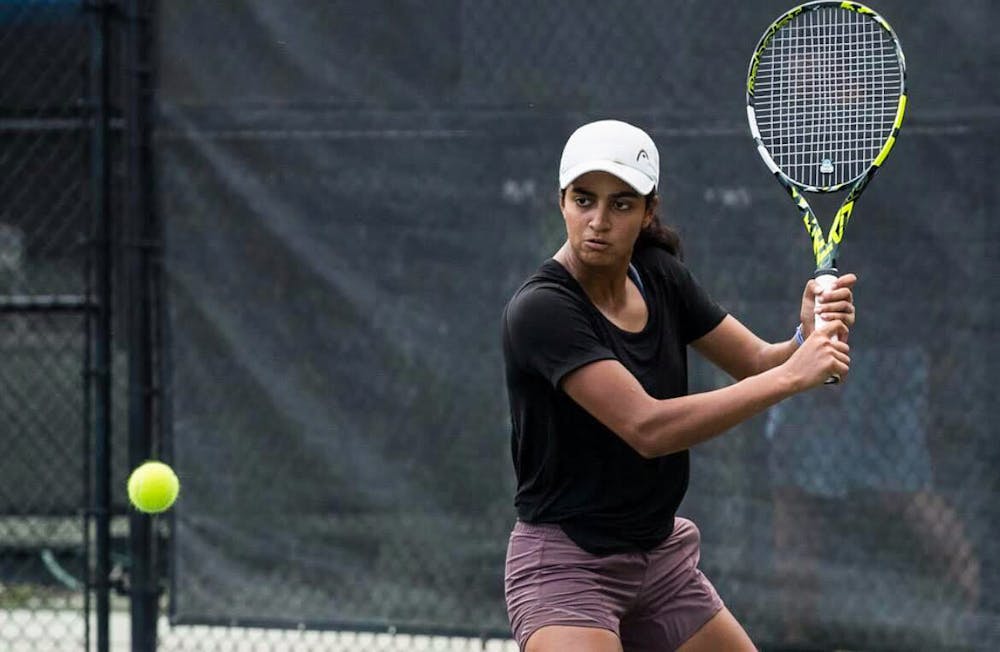
Capping off a dominant fall campaign, Penn women’s tennis freshman Esha Velaga traveled to San Diego to compete in the Intercollegiate Tennis Association National Fall Championships earlier this month — further showcasing her elite talent.
Despite losing her first match to Anika Yarlagadda from the University of North Carolina — who, Velaga noted, is five years older than her — Velaga put up an impressive run in the consolation bracket, reaching the semifinals before finally getting bounced out by the University of California, Berkeley’s Jessica Alsola. Velaga is the first Quaker in two years to make it this far in the competition.
“I think what one needs to recognize is that [Nationals] is the most selective tournament that exists in college tennis,” coach Sanela Kunovac said.
Given that only 32 women's tennis athletes from across the country are selected to participate, Velaga’s performance is that much more special, especially considering where she is in her very young collegiate career. However, Kunovac believes Velaga could have gone even further had she slightly adjusted her mentality coming into the tournament.
“I think she went into it a little bit like, ‘let me see what the competition is like,’ instead of going into it the way she went into the Super Regionals, which is, ‘I could win this,’” Kunovac said.
Velaga echoed similar sentiments, saying, “I feel like I didn't play my best in [the first] match. I think I got a little nervous just being in that environment, but it was just fun to play it anyway.”
Regardless, Velaga’s initial loss set up a rematch against an opponent who was all too familiar: her sister Neha — a current senior at Princeton. Esha had beaten her sister just a few weeks earlier in two sets to win the Northeast Super Regional and qualify for Nationals.
“It’s definitely a little weird playing her [because] even in junior tennis, we never actually ended up playing each other. So Super Regionals was the first time we had played each other,” Esha said. “We both know how each other plays really well. I think it’s more just a mental battle because I don’t really want to beat her, but at the same time, I want to win the match.”
Kunovac noted that when athletes play a sibiling, the coaches do not give any scouting input and do not even stay on the court during the match. It’s all on Esha, and that’s exactly how she wants it.
Ultimately, Velaga got the best of her older sister yet again, cruising to victory 6-1, 6-3. She then played a closer match against Selma Cadar from the University of Maryland in the consolation quarterfinals, pulling off a three-set win before falling to Alsola 6-1, 6-4.
Velaga exits Nationals and the fall season with a total singles record of 16-3, and certainly seems poised to continue her success in the spring, which all stems from how determined she is to continue getting better and improving upon her weaknesses.
“She’s looking to test her limits. She’s not somebody who’s very content with being a one trick pony,” Kunovac said.
Kunovac also stressed that Velaga is hungry to learn, and has plenty of potential going forward. If she keeps progressing at the rate that she is, Kunovac envisions a “headache deciding which way to go” between her current plan of becoming a doctor and playing tennis at the professional level. Whatever she ends up doing four years from now, it is clear that there is really no limit as to what Velaga can accomplish in this game.
While Velaga will continue to work and try to reach the potential that Kunovac and undoubtedly many others see for her, she does not need to worry about her attitude and relationships with her fellow teammates. Kunovac said that many top players coming in have trouble adjusting to being around a team, but that Velaga has had no trouble with this. Velaga always brings a playful energy to the locker room, and she manages to do this despite how single-minded she is towards winning when she eventually steps out on the court.
“Everybody always wants to talk about Esha’s performance in tennis, and I think what's sometimes not highlighted, because she's so dominant in tennis, is just how phenomenal a person and a teammate she is,” Kunovac said. “As a coach, you feel like you won the lottery.”
The Daily Pennsylvanian is an independent, student-run newspaper. Please consider making a donation to support the coverage that shapes the University. Your generosity ensures a future of strong journalism at Penn.
Donate







